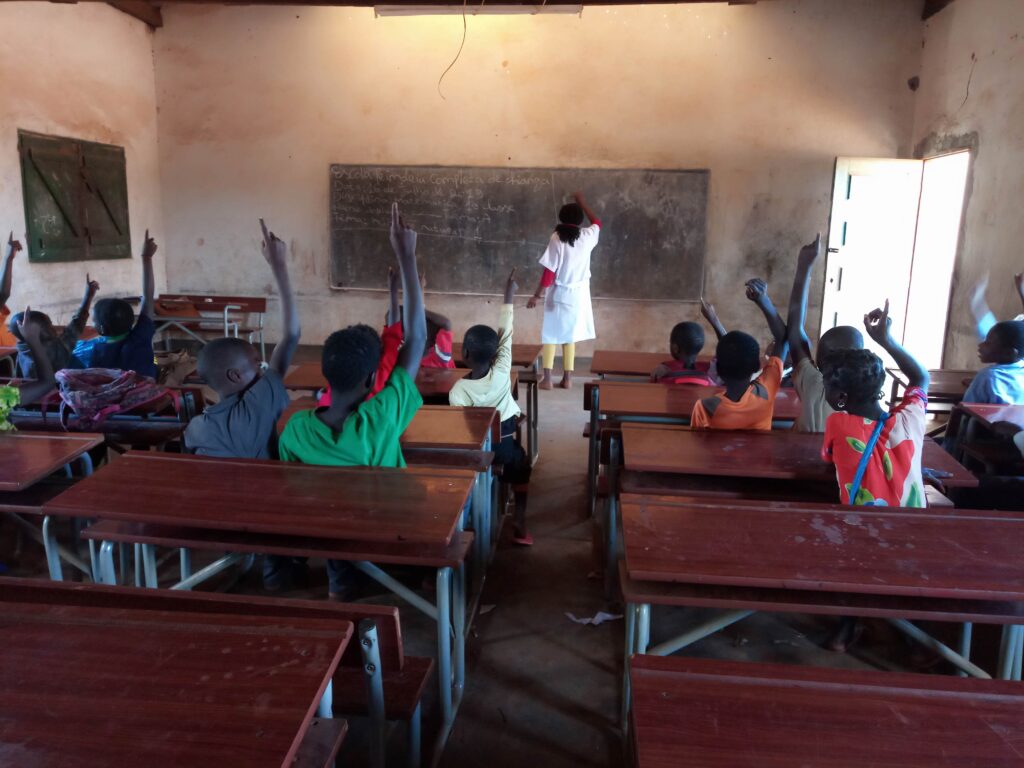The school has one water source that doesn’t supply enough water and is easily contaminated, and 2 latrines, 1 for teachers and 1 for students.
Chianga Primary School is in Chimoio district, Manica Province, Mozambique. There are 531 pupils that attend class every day – 283 boys and 248 girls.

Eliza has been a teacher at Chianga School for 8 years. “I dreamed of being a teacher since I was little. I like to pass on my knowledge to other people”.

Teachers like Eliza are inspirational. They are supporting the next generation of adults to gain skills to succeed, to finish school, to earn a fair income, to move away from poverty and have a voice in their community.
Eliza is one of 12 teachers at Chianga School, but the only woman who works there. This imbalance isn’t uncommon. Many women don’t feel safe travelling long distances alone to work in rural areas. Many marry young and stay at home in more ‘traditional’ roles.
Teachers like Eliza are inspirational, particularly to young girls…

“When I’m older I would like to be a teacher.” Costeja is 16 years old and in Grade 7. She lives in a village neighbouring the school. “My favourite thing about school is writing, I have a passion for writing.”
When Costeja is thirsty she asks to leave class to get a drink of water, like any student in any school would.
But, instead of a bottle she takes a jerry can and walks 15 minutes to the school’s ‘water fountain’ – an old well.

When she gets there she lowers the bucket deep into the well, fills it with water and pulls it back up on a rope.
Lifting the heavy bucket she fills up the jerry can and carries it back to class. It takes her around 30 minutes to complete the trip.
The more water she can carry now the fewer trips she’ll have to make throughout the day. But, of course it makes the jerry can heavier. The walk is tiring and draining and she misses out on valuable learning time.
Costeja and her classmates have to go to all this effort, just to get a drink of water. The well is unprotected and open to the elements, so the water is dirty and unsafe to drink.
Eliza teaches Grade 1, 10 and 11 year olds, she told us:
“Most students care about learning and getting a good education, but there is a big problem with disrupting class to go fetch water.”

Between 531 pupils and 12 teachers there are 2 toilets at Chianga School.
There is no privacy as neither toilet has a door and lots of pupils end up going to the loo in the bush instead. A lack of privacy is particularly distressing for young girls during menstruation.
Periods are a natural but uncomfortable cycle for every girl, but for Costeja there is no safe space to wash, or change her disposable pad. It becomes very difficult to manage her period with dignity. Costeja said:
“I think having clean latrines will help make our school better in hygiene and in health.”
With no safe waste disposal and nowhere to wash hands, illness between the students is common. Eliza told us, “some pupils are absent completely because of a lack of facilities.”
“Pupils are unable to concentrate in class from being hungry.” – Eliza
Poor diet and malnutrition can have serious impacts on young girls like Costeja’s ability to develop and succeed.
Costeja told us she is very often hungry in class. Like many families living in rural areas, her parents are farmers and survive on whatever can be grown on their land. In a ‘normal’ year, families start to reduce meal portions, or meals in general, five months before the new harvest is due – this is known as ‘the hunger gap’. A lack of water to enhance crop yields leaves her family dependent on seasonal rains to grow their food, and often leaves Costeja hungry.

























